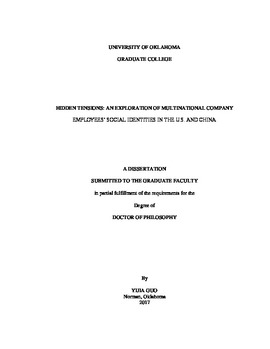| dc.description.abstract | This dissertation examined Chinese and U.S. organizational members’ multiple social identities and how they engaged in identity work to develop, organize, revise, and manage identity tensions that emerge from various identifications communicatively. More specially, identity was essential to multinational company employees’ work lives as a cross-level dynamic. They were linked, facilitated, and shaped employees’ workplace activities, such as their decision-making, work preferences, and communication. Tensions emerged as employees were guided by manage multiple identifications and endeavored to organize these identifications through communication. In-depth individual interviews were conducted with 18 Chinese and 13 U.S. volunteer participants in international companies located in China and the U.S. A modified constant comparative analysis revealed, first, four types of salient identities in both identity-encouraging and challenging contexts: individual (cultural and religious), collective (organizational, occupational, and team), positional (leader role and community role,), and relational identities (family role and friend role). Participants organized these identities differently, concluded in two identity models, the holistic and kaleidoscope model. While they were developing and organizing these identities, identity tensions also emerged: work-life challenges, member-leader transition, friend-professional switch, and cultural/religion-work challenge. Identity tensions triggered participants’ sensemaking to make sense of their identity organizations and engaged in various identity management strategies. Such strategies included passive observational learning from mentorship and workgroup cooperation in which participants were involved, as well as a set of functional (Compartmentalization, avoidance, and reframed integration), rhetorical (disclaimers, defense, venting, making clarifications, and self-deprecating jokes), and discourse (organizational discourse) identity work tactics they developed from daily routines. | en_US |
